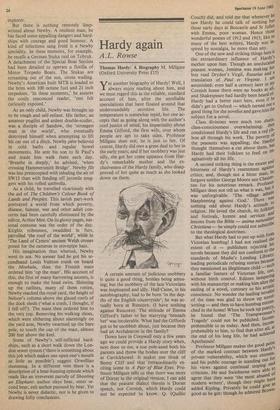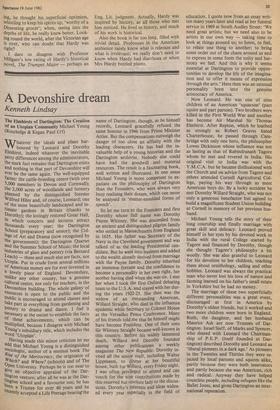Hardy again
A.L. Rowse
Thomas Hardy: A Biography M. Millgate (Oxford University Press £15) Thomas Hardy: A Biography M. Millgate (Oxford University Press £15)
-Vet another biography of Hardy! Well, I
always enjoy reading about him, and we must regard this as the reliable, standard account of him, after the unreliable speculations that have floated around that understandably secretive life. The temperature is somewhat tepid, but one ac- cepts that as going along with the author's cool justice of mind, his impartiality about Emma Gifford, the first wife, over whom people are apt to take sides. Professor Millgate does not; he is just to her. Of course, Hardy did owe a great deal to her in the early years; and if her snobbery was just silly, she got her come uppance from Har- dy's remarkable mother and the ex- clusiveness of the Hardy family, who disap- proved of her quite as much as she looked down on them.
A certain amount of judicious snobbery is quite a good thing, besides being amus- ing; but the snobbery of the late Victorians was inspissated and silly. Hall Caine, in his autobiography, had to be born 'in the dep- ths of the English countryside'; he was ac- tually born at Runcorn. (I have nothing against Runcorn). The attitude of Emma Gifford's father to her marrying 'beneath her' was intolerable. What had the Giffords got to be snobbish about, just because they had an Archdeacon in the family?
Down here in Cornwall only a few years ago we could provide a Hardy story when, next door to me, a son pole-axed both his parents and threw the bodies over the cliff at Carrickhowel. It makes one think of Beeny Cliff and that extraordinarily ex- citing scene in A Pair of Blue Eyes. Pro- fessor Millgate tells us that there was more of Dorset in the original version; I can add that the peasant dialect therein is Dorset speech, not Cornish, which Hardy could not be expected to know. Q. (Quiller Couch) did, and told me that whenever he saw Hardy he could talk of nothing but those early days at Boscastle and St Juliot with Emma, poor woman. Hence those wonderful poems of 1912 and 1913; like so many of the best writers, Hardy was in- spired by nostalgia, he more than any. One of the new and striking things here is the extraordinary influence of Hardy's mother upon him. Though an uneducated peasant woman, Jemima was making her boy read Dryden's Virgil, Rasselas and a translation of Paul et Virginie. I am astonished: even half a century later in MY Cornish home there were no books at all, and Shakespeare had hardly been heard of. Hardy had a better start here, even if he didn't get to Oxford — which turned out a good thing for the novelist and gave hint the subject for a novel. Class divisions were much too sharP, class-consciousness overwhelming: they conditioned Hardy's life and run a red rib- bon all through his work. The poverty of the peasants was appalling; the HarclYs thought themselves a cut above them, but Hardy had their folklore to feed on im- aginatively all his life. A second striking thing is the extent and bitterness of Hardy's resentment against critics; and, though not a bitter man, he forgave neither George Moore nor Chester- ton for his notorious remark. Professor Mitigate does not tell us what it was, but it was unforgivable: 'The village atheist blaspheming against God.' There Was nothing odd about Hardy's attitude to religion. He loved the church, its folklore and festivals, hymns and services and lessons from the Bible — anima naturailler Christiana — he simply could not subscribe to the theological doctrines. But what Hardy had to put up with from Victorian humbug! I had not realised the extent of it — publishers rejecting his novels because they did not conform to the standards of Mudie's Lending Library; leading periodicals refusing stories because l they mentioned an illegitimate child — suei a familiar feature of Victorian life, t°°' without birth control. Editors tamPeril! with his manuscript or making him alter the ending of a novel, contrary to his artistic t conscience. No wonder the leading novell of the time was glad to throw up nove writing — and then to have humbug entren- ched in the home! When he took up poettY' he found that 'The Trampwoman s Tragedy' could not be published. Incont- prehensible to us today. And then, ine°111' prehensibly to him, to find that after all, the end of his long life, he had achieved Apotheosis! Professor Millgate makes the good point of the marked contrast between Hardy's private vulnerability, which was extrerne; and his public courage in standing out for his views against continual sniping and criticism. He and Swinburne were able to agree that they were 'the most abused or modern writers', though they nnigh_tivheavaes added Kipling. Privately he could give as
as he got: though he admired Brown- ing, he thought his superficial optimism, whistling to keep his spirits up, 'worthy of a Dissenting grocer'; when, seeing into the depths of life, he really knew better. Look- ing round the world, after the Victorian age is over, who can doubt that Hardy was right?
I dare to disagree with Professor Mil'gate's low rating of Hardy's historical novel, The Trumpet Major — perhaps an
Eng. Lit. judgment. Actually, Hardy was inspired by history, as all those who met him noticed. He lived in history, and much of his work is historical.
Also the book is far too long, filled with trivial detail. Professors in the American ambience rarely know what is relevant and what is irrelevant; we really don't need to know when Hardy had diarrhoea or when Mrs Hardy bottled plums.





































 Previous page
Previous page